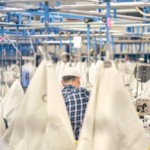UK grocery inflation has slowed for the first time in six months, bringing a slight reprieve to households struggling with the ongoing cost-of-living crisis. According to the latest data from Kantar, supermarket prices rose by 3.3% in January, down from 3.7% in December, marking a welcome decline in food inflation.
The drop was driven in part by lower prices for essentials such as toilet roll and cat food, though other staples like chocolate, butter, and chilled juices saw price increases. The figures come as supermarkets ramp up promotional offers in a bid to attract cost-conscious shoppers, with discounts reaching their highest level in four years.
Supermarkets Ramp Up Discounts
Retailers have been engaged in an aggressive price battle to win over budget-conscious customers. In the four weeks leading up to January 26, 27.2% of all supermarket sales were on discounted items, representing a 9.4% increase compared to the wider market.
“Supermarkets were dishing out the discounts this new year, and consumers responded,” said Fraser McKevitt, head of retail and consumer insight at Kantar. “Spending on promotions rose by £274 million year on year.”
Additionally, own-label products—particularly premium ranges—saw record demand, accounting for 52.3% of total supermarket sales. Shoppers appear to be seeking a balance between affordability and quality, with many turning to own-brand alternatives rather than cutting back on spending entirely.
Retail Performance: Lidl and Ocado Lead the Pack
Despite slowing inflation, grocery sales grew by just 2.8%, lagging behind price increases. This suggests that many shoppers are buying fewer items or opting for cheaper alternatives to manage household budgets.
Among individual retailers, Lidl recorded the strongest growth, with sales increasing by 7.4%. In contrast, Asda was the only major supermarket to experience a decline, with sales falling by 5.2%.
Meanwhile, Tesco—the UK’s largest supermarket—benefited from rivals’ struggles, expanding its market share to 28.5%. Online grocer Ocado continued its streak as the fastest-growing retailer for the ninth consecutive month, posting an 11.3% sales increase. Co-owner Marks & Spencer also saw strong store sales growth of 10.5%, reflecting its successful focus on premium food ranges.
What’s Next?
With overall UK inflation easing to 2.5% in December, down from 2.6% in November, analysts are speculating that the Bank of England may cut interest rates from 4.75% in the coming months. However, grocery prices remain a key concern for consumers, as inflation, while slowing, continues to outpace wage growth for many households.
As supermarkets compete fiercely on price and promotions, the battle to keep customers loyal is expected to continue in the months ahead.









